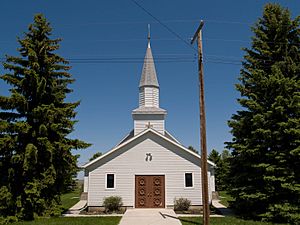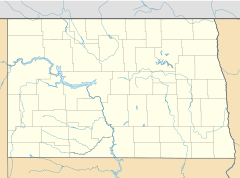Chaseley, North Dakota facts for kids
Quick facts for kids
Chaseley
|
|
|---|---|

Church in Chaseley
|
|
| Country | United States |
| State | North Dakota |
| County | Wells |
| Elevation | 1,867 ft (569 m) |
| Time zone | UTC-6 (Central (CST)) |
| • Summer (DST) | UTC-5 (CDT) |
| ZIP codes |
58423
|
| Area code(s) | 701 |
| GNIS feature ID | 1028349 |
Chaseley is a small, unincorporated community located in the southwestern part of Wells County, North Dakota, in the United States. An "unincorporated community" means it's a group of homes or buildings that isn't officially a town or city with its own local government.
Chaseley is situated along North Dakota Highway 200. This highway runs southwest of Fessenden, which is the main town and county seat of Wells County. In the past, Chaseley had its own post office and used the ZIP code 58423.
Contents
Where is Chaseley Located?
Chaseley is found in the state of North Dakota. This state is in the upper Midwest region of the United States. It's part of Wells County, which is a county in the central part of North Dakota.
Understanding Wells County
Wells County is named after Erastus N. Wells. He was a well-known politician in North Dakota. The county was created in 1873. It was officially organized in 1884. Fessenden serves as the county seat. This means it's the administrative center for the county.
Key Features of Wells County
- Geography: Wells County has a total area of about 1,290 square miles. Most of this area is land.
- Population: As of the 2020 census, about 3,900 people lived in Wells County.
- Economy: The main industry in Wells County is agriculture. Farmers grow crops like wheat and corn. They also raise livestock.
Life in Chaseley
While Chaseley is a small community, it has a history. Many small communities like Chaseley were important stops for travelers or farmers. They often had a general store or a church.
Community Life and History
Small communities like Chaseley often formed around a specific service. This might have been a church, a school, or a post office. These places served as gathering spots for local residents. They helped people connect and build a community.
The Role of Post Offices
Post offices were very important in the past. They were not just for sending mail. They also served as communication hubs. People would visit the post office to get news. It was a vital link to the outside world for many rural areas.
Images for kids
See also
 In Spanish: Municipio de Chaseley para niños
In Spanish: Municipio de Chaseley para niños




